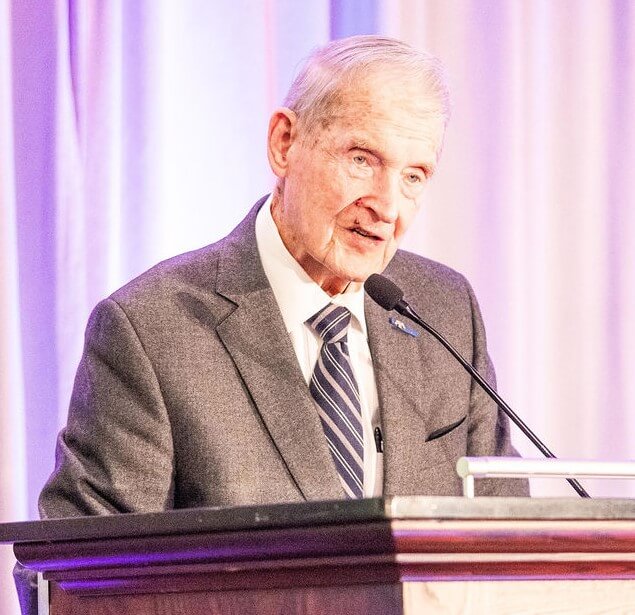Former CPR Chairman William H. Webster Dies at 101

William H. Webster, a Missouri lawyer whose skills and demeanor were credited with saving the Federal Bureau of Investigation after years of investigations and public scrutiny, and who went on to head the U.S. Central Intelligence Agency, has died, according to an announcement by his family Friday.
After returning to private practice, Webster focused on mediation and arbitration, and was a long-running member of the board of the CPR Institute, which publishes this blog. He was CPR's chairman from 2011 to 2014 after more than a decade on the board--active in the New York nonprofit organization into his 90s.
Last year, Webster returned to the CPR Institute's Annual Meeting in Philadelphia, one day after his 100th birthday, to accept the James F. Henry Award, named for CPR's founder for outstanding achievement by individuals for distinguished, sustained contributions to the field of ADR.
For the occasion, present and former CPR officials lauded Webster's contributions to the organization, to the nation, and to conflict resolution practices.
Webster is viewed as one of the nation’s most distinguished public servants. In addition to being the only person to serve as director of both the Federal Bureau of Investigation (from 1978 to 1987), and Director of the Central Intelligence Agency (from 1987 to 1991), he also was a federal court judge and U.S. Attorney.
Webster, who later was a partner in Milbank LLP, was a U.S. Navy lieutenant, serving during World War II. He was awarded the Presidential Medal of Freedom, the Distinguished Intelligence Medal, and the National Security Medal.
Speakers at the CPR Annual Meeting last year repeatedly cited Webster's stature and credibility as the base of his leadership skills and accomplishments in alternative dispute resolution; obituaries appearing on Friday echoed those same themes on Webster's better-known work in service to his country. (See, e.g., Tim Weiner, "William H. Webster, Who Ran Both the F.B.I. and the C.I.A., Dies at 101," N.Y. Times (Aug. 8) (available here); Jack Forrest, "William Webster, former head of FBI and CIA, dies," CNN (available here).)
The FBI's official statement on Webster's passing can be found here.
Webster's resolute nature translated seamlessly to the mediation, arbitration and conflict resolution work on which he focused in his latter career years in law practice and at CPR.
“There’s something about conflict prevention and resolution that has an appeal to some remarkable people," Webster told the CPR Annual Meeting audience last year, "and it has been my honored privilege to serve in various capacities. I hope you continue on."
Webster was enlisted in 1978 by President Jimmy Carter to oversee--and overhaul--an FBI beset by congressional investigations into corruption during the tenure when it was led by Webster's predecessor, J. Edgar Hoover. While Hoover died, former officials were indicted and successfully prosecuted.
Webster's moves in cleaning house were widely credited with restoring the FBI's reputation.
After nine years at the FBI, President Ronald Reagan nominated Webster to head the CIA. "His legacy will endure—not only in the institutions he guided, but in the generations of public servants he inspired to carry the torch forward," said former FBI Director Christopher Wray in a statement to CNN.
He brought that inspiration to conflict resolution. "In addition to being one of America’s most highly regarded and sought-after arbitrators and mediators," wrote former CPR Institute President Thomas J. Stipanowich on the 2024 award presentation to Webster, "he has devoted considerable time and energy to the leadership of several of the world’s best-known dispute resolution institutions." Thomas J. Stipanowich, "The Hon. William H. Webster: Patriot, Peacemaker, and Defender of Democracy," 42 Alternatives 87 (May 2024) (available on Westlaw and by request at Alternatives@cpradr.org).
Stipanowich wrote that he met Webster when both served on the board at the American Arbitration Association before CPR.
Webster served more than a decade as CPR's vice chair before assuming the role as chairman, and devoted his efforts not only to the organization's business, but also to its mission of helping others manage conflict so that they might better pursue their purpose and lessen the costs, financial and otherwise, of disputes.
Among his legacy of many CPR panels, writings, meetings, and seminars, Webster was the first interview subject to launch the organization’s YouTube channel more than a decade ago. A direct link to Webster’s comments on the efficacy of conflict resolution processes can be found at https://bit.ly/4avIrPS.
Memorial information has not yet been released.
[END]
